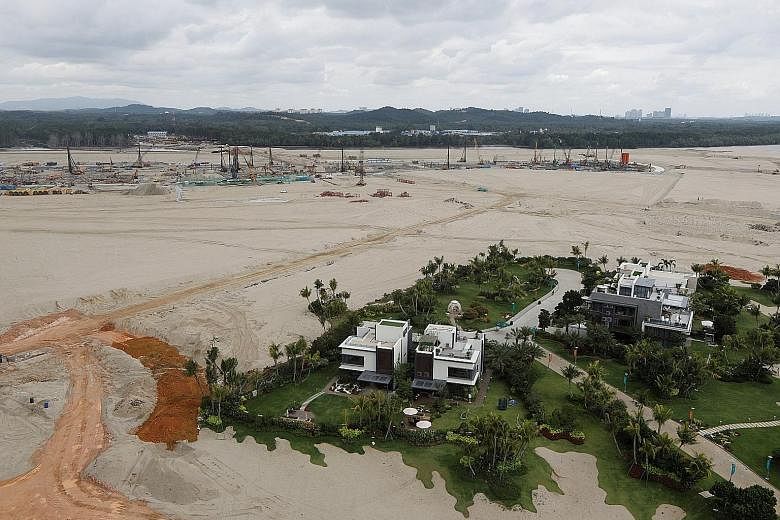HONG KONG • China's intensifying efforts to keep money from leaving the country have cast doubt over big Hollywood deals and other marquee investments.
Now, they are blocking Ms Kitty Zhu from buying her dream home.
The 39-year-old Ms Zhu, who runs a cosmetics centre in the southern Chinese city of Zhuhai, is one of hundreds of Chinese investors who have bet money on an ambitious but troubled residential project in Malaysia. More than 1,900km from China, the US$40 billion (S$56 billion) Forest City housing complex - when completed - will combine lushly green beachfront property with amenities for children and the elderly alike, according to its developer.
But while the developer is Chinese, the payments must be made in Malaysia. Ms Zhu and other buyers say they have run into problems making payments on their Forest City apartments.
"I've lost confidence in this project and I don't want to pay any more. I told my salesman that I want a refund, but he just avoids me," said Ms Zhu, who has paid nearly US$44,000 of the US$334,000 purchase price. Chinese officials are scrambling to keep money within its borders, and the efforts are hitting big companies and people like Ms Zhu alike.
China has spent US$1 trillion shoring up its currency since 2014 as big companies and regular investors shifted their money out of the country over worries about slowing economic growth and the prospect of better returns elsewhere. In response, China has put new limits on the ways Chinese can invest and use their credit cards abroad.
In December, China's foreign exchange regulator said it would take a harder look at how some were buying property, among other investments.
Last Friday, the overseas arm of UnionPay, the state-owned firm that dominates bank card payment processing in China, said it would prohibit the use of its cards for cross-border property acquisitions.
The moves could hit a large group: The Chinese invested US$33 billion in overseas commercial and residential property deals last year, according to Jones Lang LaSalle, a real estate services firm.
Building homes in overseas markets such as Hong Kong, Malaysia, Australia or New York City and marketing them to investment-minded buyers back home has become a cottage industry for China's larger property developers, who also promote the strategy as a way to help export China's industrial overcapacity.
"It is a major problem for some developers that have mega projects overseas, as it appears they sell - and were intended to sell - mainly to Chinese investors rather than local buyers," said Mr Nigel Stevenson, an analyst at GMT Research in Hong Kong.
Country Garden, the Chinese developer building Forest City in Malaysia's Johor state, has also been affected. Earlier this month it decided to temporarily close its international property sales centres in mainland China for repositioning and upgrading "in order to better meet the existing foreign exchange policies and regulations". A Country Garden spokesman said the closure of the sales centres reflected a shift to selling internationally.
For some, buyer's remorse has set in. Last year, Mr Rafael Liu's father went on a buying tour to Malaysia and liked what he saw. When he returned to China, father and son went to a Country Garden sales office and made a down payment of more than 30 per cent for an apartment costing more than US$130,000.
Since then they have been transferring payments once every three months to a bank account in the southern city of Foshan, where Country Garden is based. But recently, the developer told Mr Liu he could not make payments in China any more, and instead gave him details for accounts in Malaysia or Hong Kong to use. Mr Liu baulked at this, worried about violating China's restrictions on foreign currency transactions.
"I am not paying any more," he said. But now he and his father's investments are in limbo. They do not want to forfeit the 30 per cent penalty for a refund. And pursuing arbitration could also result in steep legal fees.
Like many other Chinese developers, Country Garden has borrowed money from overseas, which could leave it vulnerable to any weakening in the Chinese currency and to higher interest rates in the US.
A weaker currency makes paying back debt more expensive. More than half of Country Garden's US$12.8 billion in debt is denominated in US or Hong Kong dollars, though the company said last Wednesday that its overall cost of borrowing had declined.
NYTIMES



